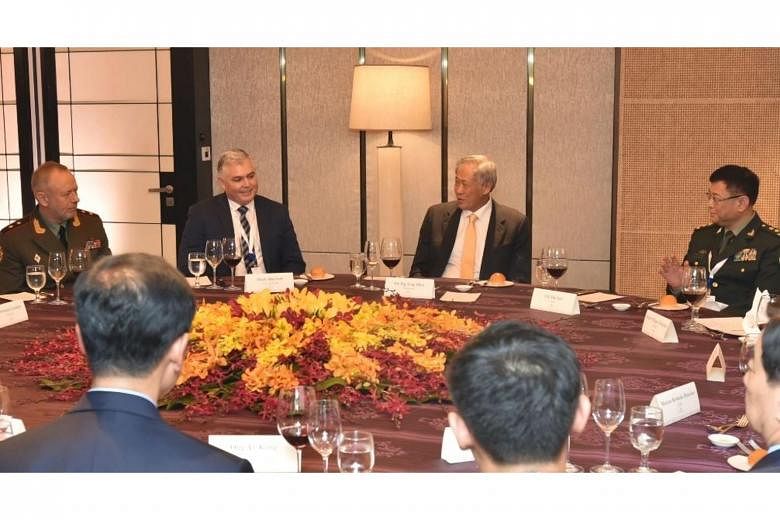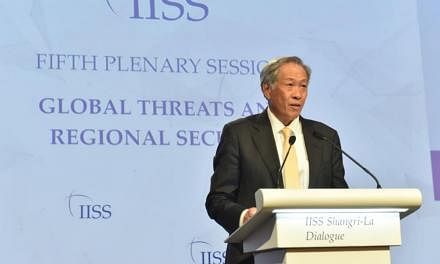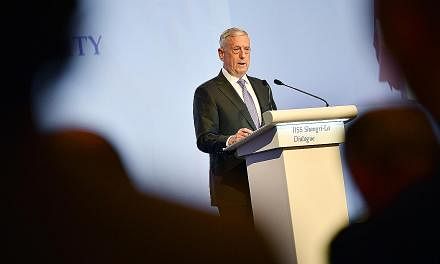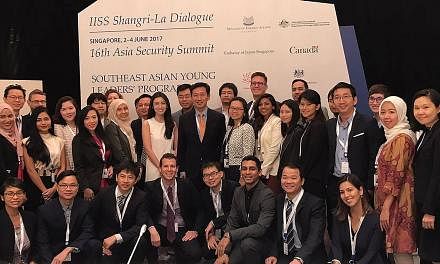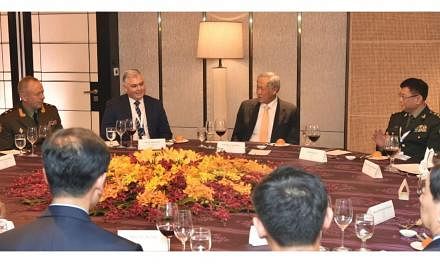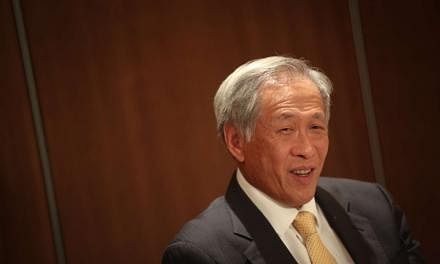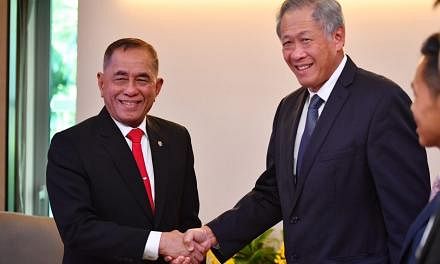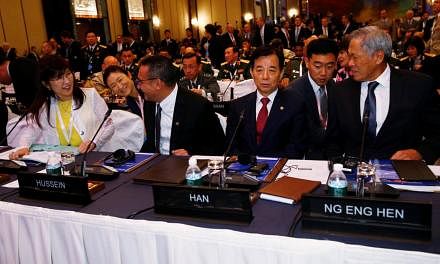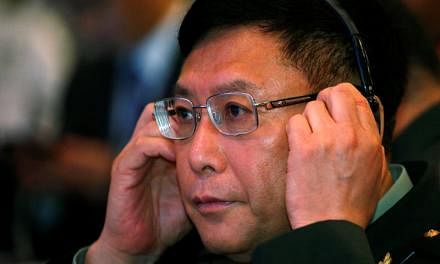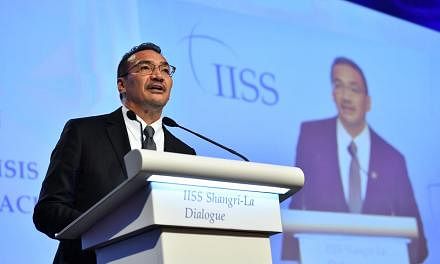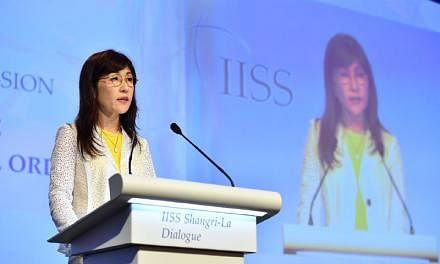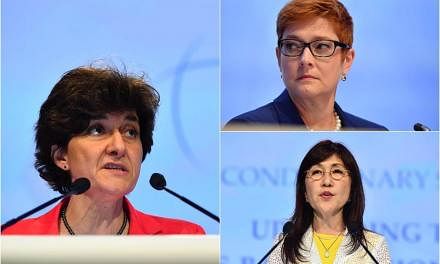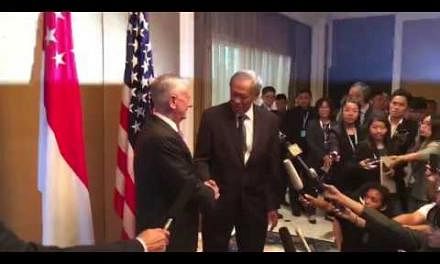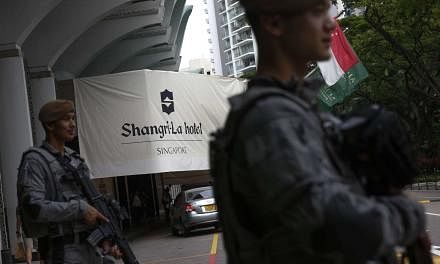SINGAPORE - Singapore is ready to take part in the Sulu Sea patrols in any way needed and welcomes indications from Malaysia and Indonesia that they want it to play a bigger role in combating maritime crime in the waters off southern Philippines, Defence Minister Ng Eng Hen said on Sunday (June 4).
From the outset, Singapore has offered to participate in any way that Indonesia, Malaysia, and the Philippines - the three countries that will conduct the joint patrols - think is appropriate, he told reporters at the end of this year's IISS Shangri-La Dialogue.
"I'm glad Indonesian Defence Minister Ryamizard Ryacudu as well as Malaysian Defence Minister Hishammuddin Hussein have said that when they are more settled they will ask Singapore. And my reply to them is we stand ready to assist in the Sulu Sea patrols or in other counter-terrorism initiatives when asked by others. It is in our interests to do so," he said.
Mr Hishammuddin said joint sea patrols would kick off on June 19, with air patrols starting at a later date.
Dr Ng added that it is imperative to prevent terrorists from exploiting networks in the Sulu Sea that facilitate illegal smuggling of weapons, humans, and drugs.
"It's part of a strategy to disrupt and prevent the terrorists from entrenching themselves in this region," he said.
Referring to the ongoing crisis in the southern Philippine city of Marawi, Dr Ng reiterated that if terrorists gain a foothold in the region, they will be able to spread their violence to Asean cities like Kuala Lumpur, Singapore, and Jakarta.
This why Singapore is a participant in the United States-led international coalition against ISIS even though the threat in Iraq and Syria is far away, he said.
"If all of us say, 'Let's wait till the danger comes to our doorstep', then that's a self-fulfilling prophecy. It will come to your doorstep and you will be vulnerable," he said.
About 400 militants linked to the Islamic State in Iraq and Syria (ISIS) terror group overran Marawi on May 23.
Philippine forces have deployed troops and air power but are still trying to retake the city, and the situation on the ground was a key concern at the dialogue, which ended on Sunday.
Dr Ng outlined the main issues that surfaced, namely the global threat of terrorism, the instability on the Korean Peninsula brought about by North Korea's nuclear weapons programme, and the discussion of what the rules of the future security order will be.
"Everyone agreed on a rules-based order but what the exact rules are, who benefits, whether it is accepted by more or less and how do you accommodate, if you would like, regional interests, minority interests, were all questions raised," he said.
At a special US-Asean defence ministers' meeting that took place in the morning, Asean countries voiced support for continued US presence in the region, he said. US Defence Secretary James Mattis' reassurance of American's commitment to the Asia-Pacific was also "well accepted", he added.
As such, the move to update the Five Power Defence Arrangements (FPDA) - a pact formed in 1971 between Australia, Britain, Malaysia, New Zealand and Singapore - is not in response to the new US administration, Dr Ng explained.
Rather, there was a need to recognise counter-terrorism as a new objective and also to incorporate new capabilities of the militaries into training exercises, he said.
When asked about the level of representation from China, which sent a team with the lowest-level chief delegate since 2012, Dr Ng he was "very happy with the Chinese contribution this year", adding that the Chinese chief delegate Lieutenant-General He Lei was very open during ministerial discussions.
Lt-Gen He is the lowest-level chief delegate from China to attend the summit since 2012. In recent years, the country was represented by an officer of at least the rank of a four-star general. He is vice-president of the People's Liberation Army (PLA) Academy of Military Sciences.
A Chinese Foreign Ministry spokesman had said at a regular press briefing that the Chinese delegation "is based on China's work requirements, and has nothing to do with China-Singapore relations". It was reported that the PLA is currently focused on implementing reforms ordered by President Xi Jinping ahead of the Chinese Communist Party's 19th party congress later this year.
Referring to this response, Dr Ng said: "The Chinese as well as PLA has given their response directly to the question and I have no reason to doubt that."
He added: "From what I hear Lt-Gen He gave a very good account, as well as other Chinese representatives, so I am very happy with the Chinese contributions this year. I look less at level of representation than what the messages are."
Dr Ng also noted that the topic of US-China relations featured less this year compared to previous editions of the forum, as it was overshadowed by the instability on the Korean Peninsula as well as the ongoing situation in Marawi.
Summing up what he thought to be a satisfying conclusion to the summit, he said: "We judge whether the Shangri-La Dialogue has been useful or not in terms of not how little disagreements it has. Sometimes, the fact that disagreements have been aired and different positions taken, is in itself a measure of success."

